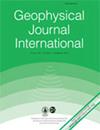在贝叶斯框架内获得可靠的中小规模地震(3.0 ≤ M ≤ 5.5)力矩张量解的新自动程序
IF 2.8
3区 地球科学
Q2 GEOCHEMISTRY & GEOPHYSICS
引用次数: 0
摘要
摘要 完整的力矩张量(MT)解法目录对固体地球科学的广泛研究至关重要。然而,由于数据和理论误差带来的不确定性,可靠的中小地震(3.0 ≤ M ≤ 5.5)MT 解法数量有限。在本研究中,我们开发了一种新程序,以提高 MT 解法的可解性,并为这些中小震级地震提供更可靠的不确定性估计。该程序是全自动的,通过两套混合线性-非线性贝叶斯反演,有效地考虑了数据和理论误差。在反演过程中,协方差矩阵采用经验方法进行估算:数据协方差矩阵由事件发生前的噪声得出,理论协方差矩阵由初始解的残差得出。我们使用三维速度模型生成的合成数据和背景地震噪声干扰进行了测试。测试结果表明,将非托普利兹数据协方差矩阵和托普利兹理论协方差矩阵结合使用,可以改善解法及其不确定性。测试结果还表明,在分析复杂构造地区的 MT 时,即使我们有最好的一维速度模型,也必须包括理论协方差矩阵。通过对班达弧北部地区地震的应用,首次发布了区域矩张量(RMT)目录,与全球中心点矩张量(GCMT)和印度尼西亚气象局气候学和地球物理学矩张量(BMKG-MT)目录相比,区域矩张量目录包含的可信解的数量增加了三倍多。比较结果表明,可信解与全球中心矩张量(GCMT)和 BMKG-MT 的焦点机制、世界应力图的最大水平应力以及研究区域的构造条件十分吻合。新获得的焦点机制提供了几个重要发现:(i) 它们证实塞拉姆岛北部和东部地区的形变受到板内斜向辐合的影响,而不是受到俯冲过程的影响;(ii) 它们用更多的焦点机制验证了新发现的 Amahai 断层;(iii) 它们揭示了在 2019 年安汶-凯拉图地震(Mw 6.5)之前六年发生的 Mw 4.7 地震,其位置和震源机制与之前未确定的断层相同。本文章由计算机程序翻译,如有差异,请以英文原文为准。
A new automated procedure to obtain reliable moment tensor solutions of small to moderate earthquakes (3.0 ≤ M ≤ 5.5) in the Bayesian framework
Summary The complete catalog of moment tensor (MT) solutions is essential for a wide range of research in solid earth science. However, the number of reliable MT solutions for small to moderate earthquakes (3.0 ≤ M ≤ 5.5) is limited due to uncertainties arising from data and theoretical errors. In this study, we develop a new procedure to enhance the resolvability of MT solutions and provide more reliable uncertainty estimates for these smaller to moderate earthquakes. This procedure is fully automatic and efficiently accounts for both data and theoretical errors through two sets of hybrid linear-nonlinear Bayesian inversions. In the inversion process, the covariance matrix is estimated using an empirical approach: the data covariance matrix is derived from the pre-event noise and the theoretical covariance matrix is derived from the residuals of the initial solution. We conducted tests using synthetic data generated from the 3D velocity model and interference from background seismic noise. The tests found that using a combination of the non-Toeplitz data covariance matrix and the Toeplitz theoretical covariance matrix improves the solution and its uncertainties. Test results also suggest that including a theoretical covariance matrix when analyzing MT in complex tectonic regions is essential, even if we have the best 1D velocity model. The application to earthquakes in the northern region of the Banda Arc resulted in the first published Regional Moment Tensor (RMT) catalog, containing more than three times the number of trusted solutions compared to the Global Centroid Moment Tensor (GCMT) and the Indonesian Agency for Meteorology Climatology and Geophysics Moment Tensor (BMKG-MT) catalog. The comparison shows that the trusted solutions align well with the focal mechanism of the GCMT and BMKG-MT, as well as with the maximum horizontal stress of the World Stress Map, and tectonic conditions in the study area. The newly obtained focal mechanisms provide several key findings: (i) They confirm that the deformation in the northern and eastern parts of Seram Island is influenced by oblique intraplate convergence rather than by the subduction process; (ii) They validate the newly identified Amahai Fault with a greater number of focal mechanisms; (iii) They reveal an earthquake Mw 4.7 with the same location and source mechanism six years before the 2019 Ambon-Kairatu earthquake (Mw 6.5) which occurred on a previously unidentified fault.
求助全文
通过发布文献求助,成功后即可免费获取论文全文。
去求助
来源期刊

Geophysical Journal International
地学-地球化学与地球物理
CiteScore
5.40
自引率
10.70%
发文量
436
审稿时长
3.3 months
期刊介绍:
Geophysical Journal International publishes top quality research papers, express letters, invited review papers and book reviews on all aspects of theoretical, computational, applied and observational geophysics.
 求助内容:
求助内容: 应助结果提醒方式:
应助结果提醒方式:


